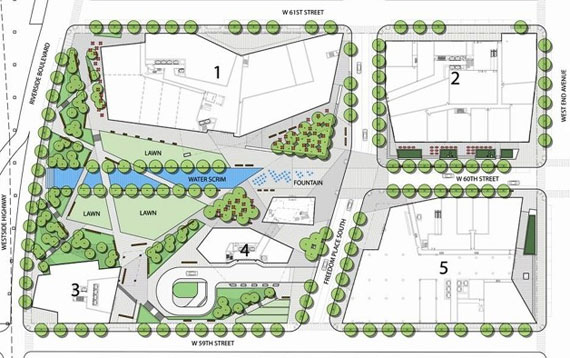Major Test for Parking Reform Shaping Up on Manhattan’s West Side
 The site plan for Riverside Center includes a large ramp for motorists to access below-ground garages (bottom center). Image: Extell Development
The site plan for Riverside Center includes a large ramp for motorists to access below-ground garages (bottom center). Image: Extell DevelopmentAre New York City’s planning commissioners serious about parking reform? An important test case is shaping up on Manhattan’s west side, where Extell Development is trying to build 1,800 parking
spaces in an area the size of two city blocks.
The site is just a few blocks north of Hudson Yards, where the city recently put a hard cap on the number of parking spaces that can be built. When the City Planning Commission enacted those parking limits, they asserted that capping parking is "consistent with the objective of creating an area with a transit- and pedestrian-oriented neighborhood character." It remains to be seen whether city planning will follow through on that objective elsewhere in the city, or if the Hudson Yards parking cap was a one-off victory for residents fed up with the proliferation of off-street parking and the traffic it generates.
The Extell project, known as Riverside Center, would construct 1,800 spaces for 2,500 residents and a mix of stores — including a car dealership — on a site between 59th Street and 61st Street near the Hudson River waterfront.
Cramming that much parking into such a small space will promote
driving, increase congestion, and erode the walking environment. As a result, the street-level design of the Extell project, which includes several curb cuts to allow motorists to access garages, doesn’t call to mind "a transit- and pedestrian-oriented neighborhood character." Any way you slice it, the proposal for 1,800 parking spaces is excessive and completely inconsistent with the sustainability goals in PlaNYC:
- The site straddles two zones where parking construction is restricted by law. Below 60th Street, parking maximums are set at a 20 percent ratio — developers can only build one parking spot for every five residences. Above 60th Street, the maximum is 35 percent. Extell contends that 45 percent of the residences at Riverside Center will need a parking space.
- Only about 25 percent of households in this part of Manhattan own cars, according to the 2000 Census.
- The Extell project is the final piece in a massive development site, known as Riverside South, stretching from 59th to 72nd Street. A 1993 agreement set the number of parking spaces to be built in the entire area at 3,500. More than 2,600 spaces have already been built on the rest of the site, so erecting 1,800 more will exceed the amount in the original agreement by nearly 1,000 spaces.
The Planning Commission is expected to certify the Extell project at a hearing this afternoon, which is not a final verdict but will set in motion the public review process. The local community board will weigh in with recommendations, and so will Borough President Scott Stringer. The Planning Commission can then approve the project, disapprove, or approve with modifications. The final vote rests with the City Council.
Objections to the volume of parking planned for Riverside Center have come from several sources. A coalition of sustainable transportation advocates including the
Straphangers Campaign, Transportation Alternatives, and the Tri-State
Transportation Campaign have told Stringer that
Riverside Center should not be developed using Extell’s car-centric, towers-in-the-park template. Manhattan Community Board 7 has called for total parking on the site to be reduced by 30 percent [PDF]. (The board is also asking for a 20 percent reduction in the total size of the project.) Local activists who successfully fought the Hudson Yards parking bonanza have mobilized to debunk the assumptions behind the parking projections in Extell’s proposal.
Council Member Gale Brewer, whose position will be critical when the project reaches the City Council, believes that there’s no reason for Extell to build so much parking, said Jesse Bodine, her director of constituent services. Brewer hasn’t come out with a specific target for reducing the amount of parking, but she expects the proposal to be modified to include less parking by the time the council votes on it.
The most intriguing part of the process will come before the City Council vote, when the Planning Commission reviews the project. The commissioners can let Extell’s proposal move forward without any attempt to mitigate the parking disaster. Or they can render a verdict that’s consistent with their rhetoric on Hudson Yards and the sustainability objectives laid out in PlaNYC.